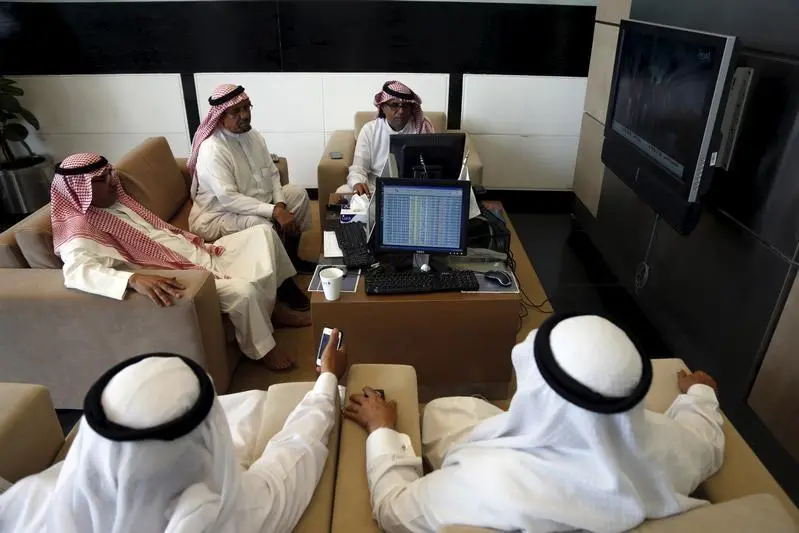PHOTO
(Adds background, details from SPA)
RIYADH, Nov 7 (Reuters) - Saudi Arabia's government has discussed settling payments to the private sector before the end of the fiscal year, the state news agency reported on Monday.
The government economic body known as Council of Economic and Development Affairs (CEDA) has also cancelled projects valued at up to 1 trillion Saudi riyals ($266.7 billion), the Saudi Press Agency said.
The CEDA was looking at making the private sector payments, which have been delayed by sharp declines of oil revenues, before the end of December, the SPA said without giving a size for the delayed payments.
"The CEDA has also stopped awarding a big number of projects whose spending does not go in line with the expected economic and development return ... which could have reached 1 trillion Saudi riyals if contracted," it said.
The construction industry has been hit hard this year by state spending cuts, part of an austerity drive in response to low oil prices, and by months-long delays in the government settling its debts to contractors. Industry executives have said billions of dollars may be involved.
Outgoing finance minister Ibrahim Alassaf said in mid-October that payments to construction firms would now rise - apparently a recognition of the damage that the payment delays were doing to the economy. He didn't elaborate.
The government has reduced or suspended payments that it owes to construction firms, medical establishments and even some of the foreign consultants who helped to design the economic reforms. One analyst estimated unpaid dues for construction firms alone totalled 80 billion riyals.
Bankers in contact with Saudi economic officials expect the 2016 budget deficit, which will be revealed when the government announces its 2017 budget plan in late December, to come in well below Riyadh's original projection of 326 billion riyals. Businessmen and analysts in the kingdom say Saudi Arabia has avoided an economic crisis due to low oil prices this year but the outlook for state finances and growth will remain murky for many months to come.
(Reporting by Reem Shamseddine and Marwa Rashad. Editing by Jane Merriman and Ralph Boulton) ((Reem.Shamseddine@thomsonreuters.com; +966503335202; Reuters Messaging: reem.shamseddine.thomsonreuters.com@reuters.net))
RIYADH, Nov 7 (Reuters) - Saudi Arabia's government has discussed settling payments to the private sector before the end of the fiscal year, the state news agency reported on Monday.
The government economic body known as Council of Economic and Development Affairs (CEDA) has also cancelled projects valued at up to 1 trillion Saudi riyals ($266.7 billion), the Saudi Press Agency said.
The CEDA was looking at making the private sector payments, which have been delayed by sharp declines of oil revenues, before the end of December, the SPA said without giving a size for the delayed payments.
"The CEDA has also stopped awarding a big number of projects whose spending does not go in line with the expected economic and development return ... which could have reached 1 trillion Saudi riyals if contracted," it said.
The construction industry has been hit hard this year by state spending cuts, part of an austerity drive in response to low oil prices, and by months-long delays in the government settling its debts to contractors. Industry executives have said billions of dollars may be involved.
Outgoing finance minister Ibrahim Alassaf said in mid-October that payments to construction firms would now rise - apparently a recognition of the damage that the payment delays were doing to the economy. He didn't elaborate.
The government has reduced or suspended payments that it owes to construction firms, medical establishments and even some of the foreign consultants who helped to design the economic reforms. One analyst estimated unpaid dues for construction firms alone totalled 80 billion riyals.
Bankers in contact with Saudi economic officials expect the 2016 budget deficit, which will be revealed when the government announces its 2017 budget plan in late December, to come in well below Riyadh's original projection of 326 billion riyals. Businessmen and analysts in the kingdom say Saudi Arabia has avoided an economic crisis due to low oil prices this year but the outlook for state finances and growth will remain murky for many months to come.
(Reporting by Reem Shamseddine and Marwa Rashad. Editing by Jane Merriman and Ralph Boulton) ((Reem.Shamseddine@thomsonreuters.com; +966503335202; Reuters Messaging: reem.shamseddine.thomsonreuters.com@reuters.net))





















